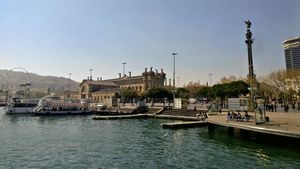Tajikistan and Tunisia are under the spotlight as both countries face international scrutiny following recent political imprisonments, including high-profile trials and severe sentences against opposition leaders.
On one side, Tajikistan has sentenced several former high-ranking officials to prison terms of up to 27 years, following what local media have described as closed-door trials. The Central Asian nation has been ruled by President Emomali Rahmon since 1992, and these trials are emblematic of the political repression frequently associated with his administration.
Reports indicate the accused, including Khamrokhon Zarifi, former foreign minister, and Saidjafar Usmonzoda, leader of the political party, each received the maximum sentence of 27 years. Seven others, comprising diplomats, journalists, and members of pro-government political factions, faced varying prison terms ranging from eight to 18 years. A lawyer representing one of the defendants supported these details, confirming the harsh outcomes to Agence France-Presse.
Since last year, Tajik authorities have accused these figures of plotting a coup, alleging their guilt was “fully established” before the trials even commenced. Human Rights Watch condemned what it described as the increasing oppression within the nation, calling for the government to cease its crackdown on political dissent.
Meanwhile, Tunisia has also entered a difficult chapter as opposition leader Rached Ghannouchi faces mounting prison sentences following politically charged trials. The Ennahdha party, which Ghannouchi heads, condemned the additional 22-year sentence imposed on him by the country’s courts, labeling the charges as “a blatant assault on the independence and impartiality of the judiciary.” The party issued statements asserting the proceedings were riddled with numerous violations, asserting this trial was clearly motivated by political contention.
Ghannouchi, who is 83 years old, was initially arrested in April 2023 and sentenced to one year for charges related to incitement. Following accusations alleging Ennahdha received foreign contributions, he was sentenced to three years. The latest ruling enhances his total prison time significantly, with charges including “plotting against state security” leading to the additional lengthy prison sentence.
Ahmed Gaaloul, Ghannouchi's advisor, expressed concerns over the state’s political integrity, stating, "Saied needs a propaganda tool at this time of deep economic crisis," referring to President Kais Saied's government. He argued the current political actions were more focused on image than justice, implying the regime would see even harsher penalties delivered to political opponents.
Several other figures associated with the Ennahdha party have also received prison sentences during this period. Former Prime Minister Hichem Mechichi garnered 35 years, having been living abroad since 2021 when Saied enacted measures many critics labeled as a coup. Others, like Said Ferjani, sentenced to 13 years, deemed their charges as having been manufactured to eliminate dissent.
Significantly, among those sentenced were Ghannouchi's own family, with his son, daughter, and son-in-law receiving sentences ranging from 25 to 35 years. The court also delivered sentences to journalists from Instalingo, the digital content production firm presently under scrutiny after Saied’s 2021 power takeoff, raising alarms about freedom of the press under the current administration.
Lawyer Mokthar Jmai described the rulings against journalists as politically motivated efforts to silence dissenting voices. His sentiments echoed criticism directed at the government characterized by the assertion, "These are unjust and political rulings aimed to eliminate political opponents."
Under President Saied, the parliament was suspended and later dissolved to allow for rule by decree, with legislative elections showcasing low voter participation due to opposition boycotts. Critics argue this trend signals the return of authoritarian leadership, endangering democratic principles established after the 2011 Arab Spring protests.
According to the National Authority for the Prevention of Torture, Tunisia's prison population has soared to over 32,000 inmates, significantly up from figures recorded just years prior. Despite high-profile judgments being delivered, Saied adamantly maintains his actions were justified to rescue Tunisia from political turmoil.
With both Tajikistan and Tunisia embroiled in crises of political legitimacy marked by the trials and imprisonment of dissenting voices, advocates for human rights are increasing calls for international oversight. The repercussions of these incidents could redefine the political landscapes of both nations, particularly concerning the balance of power, civil liberties, and governance standards.



